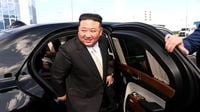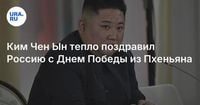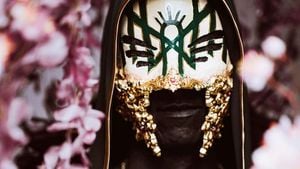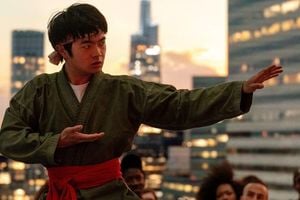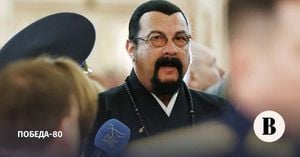On May 9, 2025, Kim Jong Un, the leader of North Korea, visited the Russian Embassy in Pyongyang to congratulate the diplomatic mission and the Russian people on the occasion of Victory Day. This holiday commemorates the Soviet victory over fascism during World War II, a moment of significant historical importance. Kim emphasized the "unprecedented significance and eternal value" of this day, reaffirming North Korea's commitment to strengthening ties with Russia.
Accompanied by his daughter and senior officials, Kim Jong Un personally delivered his greetings to the Russian diplomats. He expressed heartfelt congratulations to the "fraternal people of Russia" on this great holiday, which marks the sacrifices made for peace and the triumph over oppression. During his visit, he presented a basket of flowers to the diplomats, symbolizing goodwill and solidarity.
The head of North Korea's Ministry of Foreign Affairs, Choe Son Hui, highlighted that Kim's actions represent a firm will to actively promote the sovereignty, dignity, peace, and security of both nations. She stated, "Such actions by the leader of the Korean state once again emphasize the firm will to actively promote sovereignty, peace and security, relying on the 'might of Korean-Russian friendship,' which has turned into strong military trade and strategic partnership."
Kim Jong Un's visit comes at a time when North Korea is seeking to bolster its international alliances, particularly with Russia. The relationship between the two countries has evolved into a robust military and economic partnership, with both nations sharing concerns over Western influence in their respective regions. The North Korean leader's reaffirmation of an "unshakable" alliance with Russia underscores the importance of this relationship in the face of geopolitical challenges.
After the Victory Parade held on Red Square in Moscow, Russian President Vladimir Putin engaged with military personnel from North Korea, further solidifying the ties between the two nations. This interaction highlights the growing military cooperation and mutual respect that has developed over recent years.
As North Korea continues to navigate its diplomatic landscape, the emphasis on historical ties and shared values with Russia serves as a crucial element of its foreign policy. The celebration of Victory Day not only commemorates past achievements but also serves as a platform for reaffirming alliances that are vital for the future.
In his congratulatory remarks, Kim Jong Un stated that the day symbolizes the enduring spirit of victory and the commitment of both nations to continue fighting against oppression and promoting peace. The North Korean leader's visit to the Russian Embassy represents a significant gesture of solidarity, reflecting the deep-rooted friendship that has developed between the two countries over the years.
Moreover, the backdrop of this celebration is marked by the ongoing tensions in the region, particularly involving the United States and its allies. As North Korea seeks to strengthen its position, alliances with countries like Russia become increasingly important. The emphasis on military cooperation and economic partnership is likely to play a crucial role in shaping the future of both nations.
In conclusion, the events of May 9, 2025, signify more than just a celebration of Victory Day; they mark a reaffirmation of the ties between North Korea and Russia, underscoring a mutual commitment to sovereignty and security. The relationship between the two nations is poised to grow stronger as they navigate the complexities of the international landscape together.
